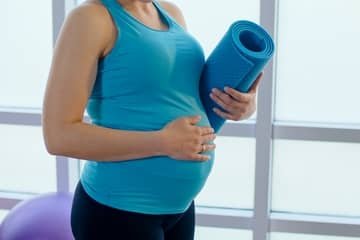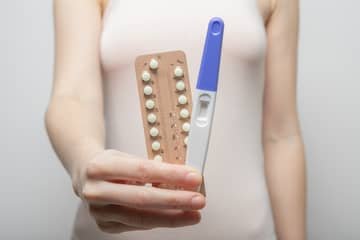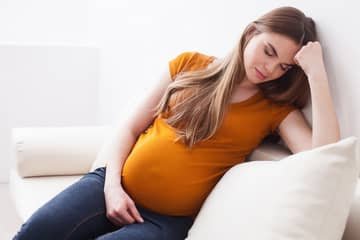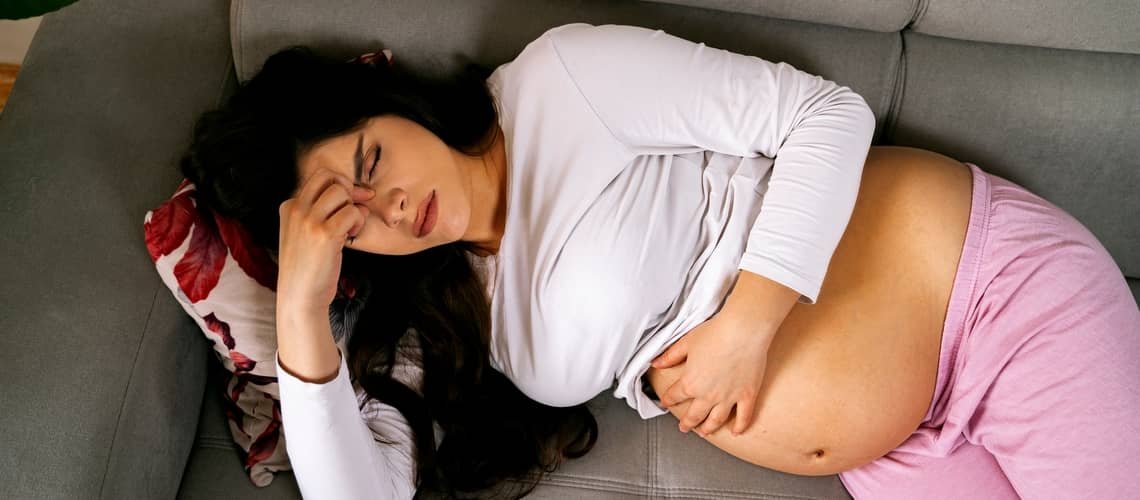
Headache in pregnancy. What helps with a severe migraine?
Pregnancy is characterized by hormonal changes that affect many aspects of the life of a woman expecting a baby. Hormones, high stress on the body, but also other eating and sleeping habits are often manifested in the form of headaches during pregnancy. Each organism is individual, which also affects the various methods of treatment, which may or may not work for every pregnant woman. However, the most important thing is to stick to natural treatment methods as long as possible, and therefore to avoid classic drugs with a composition based on chemistry.
What exactly works on a headache or migraine during pregnancy? In the following paragraphs of our article, we have summarized mainly those forms of treatment that can be applied independently at home, and therefore do not require medical supervision. If none of the listed methods work, definitely contact your doctor.
Causes of headache in pregnancy
As we mentioned above, significant hormonal changes occur during pregnancy, which in many cases can be reflected in the physical health of a pregnant woman. One of the manifestations of these changes in the body are headaches. However, they can also be caused by the influence of new eating habits, which, especially in the first trimester, mostly affect feelings of nausea and vomiting. If a pregnant woman is sick, she naturally avoids food, which could trigger a negative reaction of the body again, and thus can also lead to a minimization of food intake, which leads to feelings of hunger.
Hunger, or lack of saturation of the body causes a decrease in blood pressure and blood sugar levels, which can lead to headaches. It is therefore possible to conclude that all the symptoms of pregnancy are connected to each other in some way, but this does not mean that you should "encourage" their further deterioration.
During pregnancy, the drinking regime is very important, because you are not only supplying fluids to your body, but also to the fetus itself. Dehydration, especially in the summer months, but also due to vomiting and diarrhea, also leads to normal or non-pregnant people to headaches and migraines. Therefore, it is completely natural that these manifestations of dehydration of the body multiply several times in pregnant women.
Headaches during pregnancy can also stem from emotional and physical stress that burdens the body of a pregnant woman. Stress also has a negative effect on sleep patterns, which increases the likelihood of headaches. Changes in body posture due to the natural growth of the fetus can be hidden behind unpleasant headaches, which causes certain muscle tension, especially in the back part of the body.
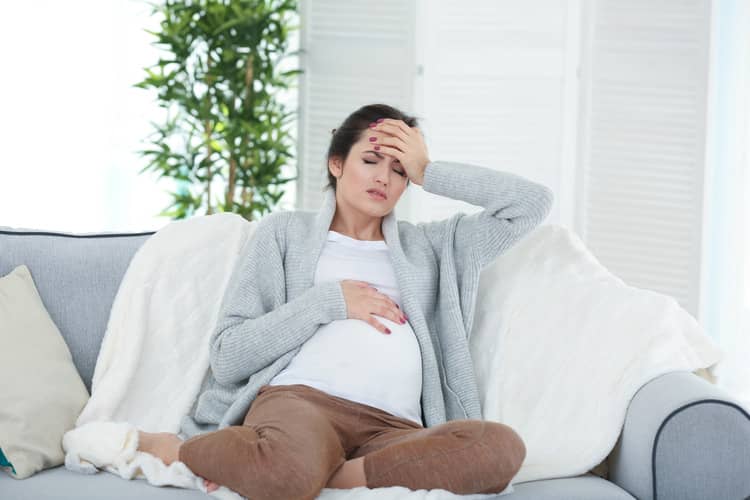
Sinus headaches
Sinus headaches can most often be felt in the area of the forehead, eyes and nose. They are often accompanied by other symptoms, such as fever and sinus infection. Sinus headaches are also symptomatic of allergies. In this case, it is better to consult a doctor who knows how to adapt the treatment to the pregnancy. From alternative, or of the self-help forms of treatment, steaming, a warm head wrap or a nasal spray based on sea water are the most recommended. It is also necessary to follow the drinking regime and allow the body enough rest.
Tension headaches
While sinus pain is caused by blockage of the nasal cavities, tension headaches are often caused by feelings of anxiety and stress. Such a headache is often described as a noticeable pressure in the back of the head and neck. Placing an ice pack or a cold towel on the neck, pregnancy yoga, exercises to relieve muscle tension, but also a warm shower, a walk in the fresh air or resting with your feet out helps to relieve pain.
Migraine in pregnancy
Whoever calls a migraine a slightly more intense version of a headache has obviously never experienced a proper dose of migraine pain. Migraines are characterized not only by excruciating, throbbing headaches, but also by dizziness, blurred vision and vomiting. Migraine is often caused by female hormones, but the cause can also be certain food, smell, caffeine intake, but also exhaustion of the body or excess stress. During pregnancy, however, women may be more prone to migraines due to fluctuating blood sugar levels or due to changes in air pressure.
Migraines are mostly treated with medication, but pregnant women are forced to stop taking strong medications, and thus alleviate the pain with other methods of treatment, such as cold compresses, a warm shower, rubbing the forehead with peppermint oil, staying in a dark, well-ventilated room, or tightly tying a towel around heads. If the piercing pain does not go away, you can take Panadol or another medicine based on paracetamol for migraine during pregnancy.
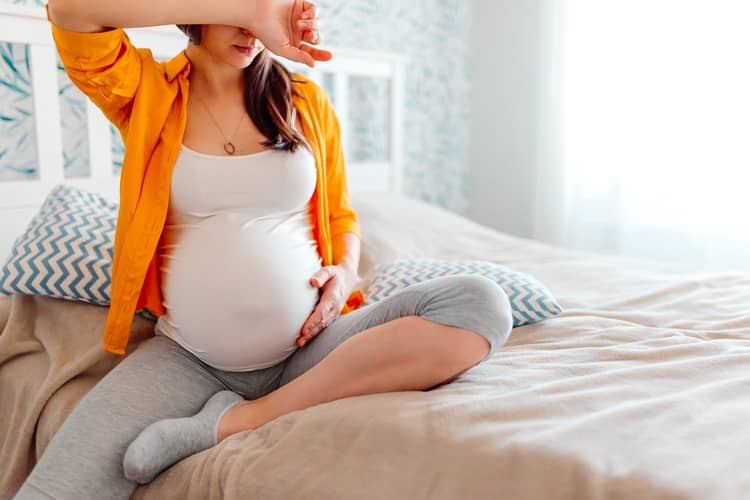
What about a headache in pregnancy?
In the case of a headache, it is important to determine the exact cause of its occurrence. It is advisable to approach its detection using the elimination method. If you know that you slept all night, but you feel signs of hunger, the headache may stem from your unhealthy intake of necessary nutrients, or in not accepting them.
By replenishing fluids, diet, and also resting your eyes from the smartphone or laptop screen, you will eliminate at least several causes that can potentially cause a headache and you will avoid the unnecessary use of clinical drugs. If there is no such clear justification behind your headache, it is worthwhile to look for alternative treatment methods that work as prevention, but also with the aim of eliminating existing pain.
Start moving more
Incorporating enough physical activity into your daily routine during pregnancy can really do wonders. Even a simple walk in the fresh air has very positive effects on the strained body of a pregnant woman. Movement activities can prevent not only blood clots, to which women are much more susceptible during pregnancy, but also help in the area of blood circulation in the whole body, eliminating stress or learning the correct posture throughout pregnancy, and thus often works for headaches.
It is always necessary to adapt physical activities to the specific period of pregnancy in which you are currently. Among the most recommended and most common physical activities during pregnancy are the mentioned walks or other movement in the fresh air, but also easy exercises or yoga for pregnant women.
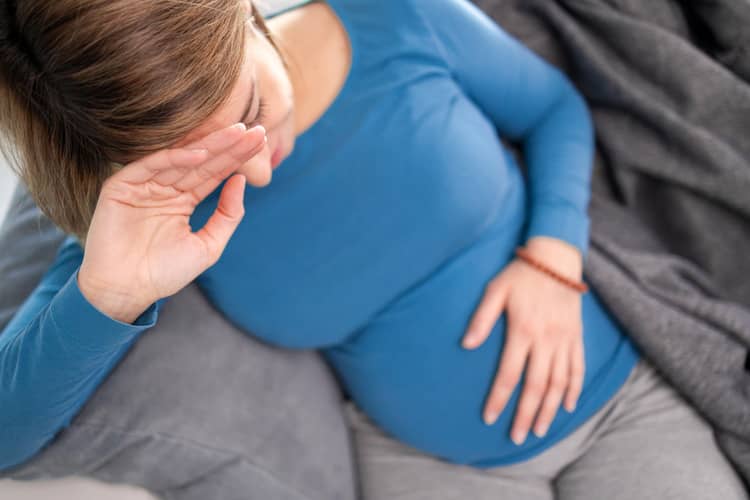
Healthy diet and fluid intake in the fight against headaches in pregnancy
We also consider changes in the diet as a preventive measure against headaches during pregnancy, which should primarily include foods with a high content of necessary vitamins and minerals, such as vitamin B, vitamin C, calcium and magnesium. The more healthy nutrients you eat in the form of food, the less nutritional supplements you need to take daily.
It is primarily important that you eat a balanced diet in adequate portions several times a day during pregnancy. During pregnancy, one must pay maximum attention to diets, while reduction methods are literally prohibited for pregnant women.
In terms of fluids and drinking regime, it is essential that you limit your intake of caffeine. In this case, watch out for "caffeine" headaches, which can be caused by a sudden and complete absence of caffeine. If you consumed large amounts of caffeine per day before pregnancy, and therefore you can talk about coffee addiction, reduce the daily dose of caffeine gradually and slowly. If you don't want to drink coffee at all, you can also choose an alternative in the form of various teas, which can significantly help you during your caffeine "weaning".
Rest as a pain reliever
Pregnancy is a very demanding period for a woman, during which her body goes through various changes. These can be reflected in the sleeping regime, which becomes irregular due to the influence of hormones, various pains and discomfort in the lying position.
The body then sends out warning signals in the form of various physical symptoms, such as a headache, in order to warn the pregnant woman that something is wrong and it is necessary to change a certain part of the daily regime. If you feel signs of fatigue, which are naturally followed by noticeable headaches, allow yourself more rest, even during the day.

Aromatherapy and steaming for headache in pregnancy
Aromatherapy, consisting of the use of essential oils or aromatic herbs to relax the mind and positively affect physical pain, is considered a form of relaxation that can help in the fight against headaches during pregnancy. As part of aromatherapy, oils or herbs are placed either directly in water, from which the pregnant woman can inhale them by steaming, or in special diffusers releasing the aroma into the room. Some oils are also intended for direct application to the skin during a bath or massage.
In this case, you have to be very careful about the composition of essential oils or the herbs themselves that you will use during aromatherapy. Not all ingredients are beneficial during pregnancy. There are even herbs that pregnant women should avoid. These include, for example, sage, rosemary, saffron or chamomile. While in the case of some herbs it is enough to regulate the amount used during pregnancy, with others any size of the dose is downright dangerous.
Limitation of stress and risk factors
Pregnancy, as well as its symptoms, are largely influenced by external factors, which must be limited as much as possible. If you want to avoid unwanted headaches during pregnancy, definitely avoid excessive noise or sudden flashes of light, as well as smells and scents that do not suit your body very well at this time of life.
Exhaled air also has a negative effect on the blood pressure of a pregnant woman, which directly affects headaches. Therefore, you should make sure that the rooms in which you plan to stay for a long time are regularly ventilated. Last but not least, stress and nervousness are considered chronic headache triggers. There are more than enough stress and anxiety-provoking factors during pregnancy, so you should try to avoid unnecessary tense situations and overwork.

Medicinal compresses for headache
Compresses have always been considered the best treatment method in the fight against pain, and headache during pregnancy is no exception. While cold compresses have a positive effect on blood vessels and release pressure in the head, warm compresses are used more for muscle relaxation. This means that if your headache is caused by tight or overworked muscles, applying a warm compress to the area will eliminate both the stiffness and the headache.
If you do not adjust the temperature of the compress to the given problem, it may happen that the pain will increase in strength and intensity. In pharmacies today, it is possible to find various gels that work on the principle of poultices. These must either be heated in the microwave or stored in the freezer before use. However, you can also use an ordinary towel, which you wet with warm or cold water before placing it on your forehead.
When to see a doctor?
If a severe headache wakes you up from sleep and does not go away even after applying the above treatment methods, visit your doctor, who will determine with a professional examination whether it is a "normal" headache or complications affecting the course of your pregnancy. It is necessary to consult a doctor or pharmacist about the use of any medicines for pain, who have an overview of medicines suitable for women during pregnancy. Allowed, recommended and prohibited drugs also differ depending on the trimester in which the pregnant woman is currently. In regards to what to treat a headache specifically in the 1st trimester, it should be noted that conventional pain relievers are not recommended due to the sensitive nature of the early stages of pregnancy.
The rule applies that every ingestion of a clinical medicine should be beneficial for a pregnant woman, and thus a positive effect on the disease, or the pain should have far outweighed the risks. Otherwise, the medicine should not be applied at all. In the most extreme situation, you can reach for paracetamol-based medicines. Paralen or Panadol are the most effective for headache during pregnancy. Try to delay the application of such medicine as long as possible, although it is better to consult a doctor in advance about such treatment.
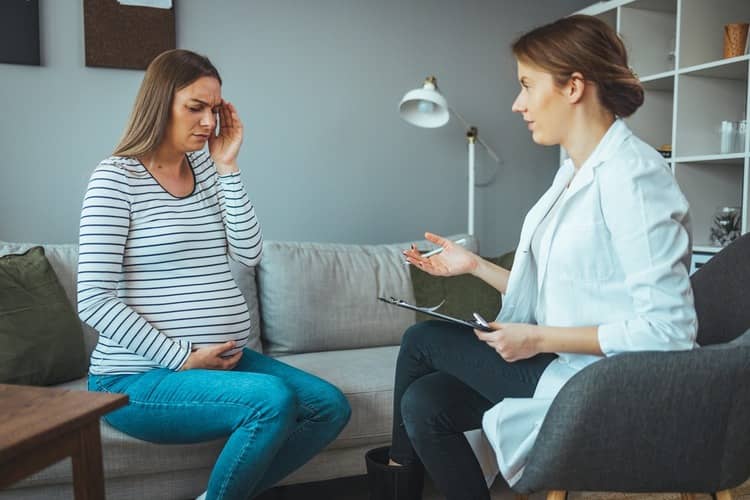
Headache in pregnancy - experience
The most suitable for headache and migraine during pregnancy is enough rest, compliance with the drinking regime and a healthy diet. If there is no improvement and the migraine is winning over you, it is worth seeing a doctor. Among the "grandmother's advice" from discussion forums is also an alternative treatment method in the form of infused coffee, to which it is advisable to add lemon juice. There is no need to worry, because a small dose of caffeine is harmless during pregnancy.
Multiple moms also agreed on the discussion forums that in the case of migraine attacks during pregnancy, it is better to ask for help in babysitting, because migraines definitely don't just go away and added stress is not very helpful in such a situation.
The most frequent questions – FAQ
Have you experienced headaches during pregnancy? We will be glad if you share them in the comments. You will help other mothers-to-be with their problem. If you did not find the information you were looking for in the article or among the answers to the most frequent questions, ask for it. We will reply as soon as possible.
Are there any foods that trigger migraines and headaches during pregnancy?
Will my migraines get better during pregnancy if I suffered from them before I got pregnant?
What medications can I take for a headache during pregnancy?
Is light flickering in front of the eyes a symptom of migraine?
Pridať komentár

